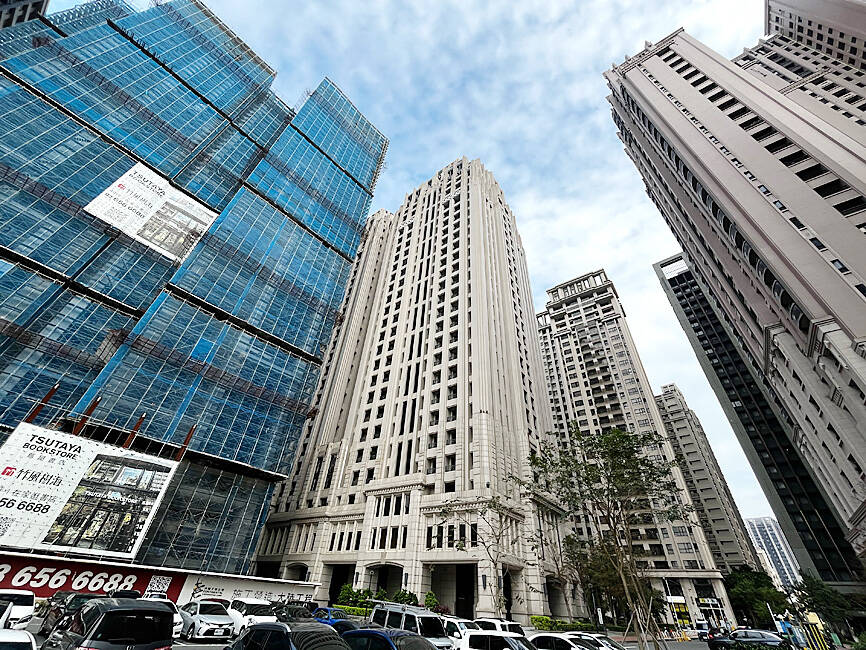House prices in Taiwan might drop by double-digit percentage points next year, with correction pressures more evident in areas with heavy supply, Evertrust Rehouse Co (永慶房屋) said yesterday.
Prices are likely to fall by 7 to 10 percent in areas with real demand, but the decline would reach 10 to 15 percent in places where property speculation underpins transactions, Evertrust Rehouse general manager Yeh Ling-chi (葉凌棋) told a news conference in Taipei, citing an internal survey and data from more than 1,800 of its outlets nationwide.
Only 33 percent of respondents expect house prices to increase in the next three months, a plunge from 55 percent three months earlier, the company said.

Photo: Hsu Yi-ping, Taipei Times
After the central bank in September introduced a new wave of credit controls to induce a soft landing in the market, prices this quarter fell by between 1.6 percent and 4.5 percent in Taiwan’s six special municipalities, as well as Hsinchu county and city, Yeh said.
The downturn was also linked to higher interest rates, the survey showed.
Interest rates start at 3 percent for non-first homes as local lenders seek to slow real-estate lending, but buyers said that an interest rate of 2.75 percent would pose an unbearable financial burden, the survey showed.
Close to 65 percent of prospective buyers said that credit tightening affected their purchase decisions, while 68 percent expressed a need for a mortgage equivalent to 70 percent of their home’s value, Evertrust research manager Daniel Chen (陳賜傑) said.
Credit controls cap loan-to-value ratios of 50 percent for second houses, and the terms are even more unfavorable for third and fourth homes across Taiwan.
In addition, non-first homes are denied grace periods.
Against that backdrop, Evertrust expects house transactions next year to shrink 18 to 21 percent to 278,000 to 288,000 units, from an advance of 13 to 16 percent to 347,000 to 355,000 units this year, Yeh said.
“Corrections in the market look inevitable,” Yeh said, adding that selling pressure would intensify.
The number of homes for sale rose 17.4 percent in the second half of this year from the first half, he said.
The company also expects about 146,436 new houses to enter the market in next three years, which would sharpen selling pressure and concentration of real-estate lending, Yeh said.
The central bank would not show leniency anytime soon and sellers who intend to pull out had better make greater price concessions, he said, suggesting that a 10 percent or deeper concession would motivate buyers.

BYPASSING CHINA TARIFFS: In the first five months of this year, Foxconn sent US$4.4bn of iPhones to the US from India, compared with US$3.7bn in the whole of last year Nearly all the iPhones exported by Foxconn Technology Group (富士康科技集團) from India went to the US between March and last month, customs data showed, far above last year’s average of 50 percent and a clear sign of Apple Inc’s efforts to bypass high US tariffs imposed on China. The numbers, being reported by Reuters for the first time, show that Apple has realigned its India exports to almost exclusively serve the US market, when previously the devices were more widely distributed to nations including the Netherlands and the Czech Republic. During March to last month, Foxconn, known as Hon Hai Precision Industry

Taiwan Semiconductor Manufacturing Co (TSMC, 台積電) and the University of Tokyo (UTokyo) yesterday announced the launch of the TSMC-UTokyo Lab to promote advanced semiconductor research, education and talent development. The lab is TSMC’s first laboratory collaboration with a university outside Taiwan, the company said in a statement. The lab would leverage “the extensive knowledge, experience, and creativity” of both institutions, the company said. It is located in the Asano Section of UTokyo’s Hongo, Tokyo, campus and would be managed by UTokyo faculty, guided by directors from UTokyo and TSMC, the company said. TSMC began working with UTokyo in 2019, resulting in 21 research projects,

Taiwan’s property market is entering a freeze, with mortgage activity across the nation’s six largest cities plummeting in the first quarter, H&B Realty Co (住商不動產) said yesterday, citing mounting pressure on housing demand amid tighter lending rules and regulatory curbs. Mortgage applications in Taipei, New Taipei City, Taoyuan, Taichung, Tainan and Kaohsiung totaled 28,078 from January to March, a sharp 36.3 percent decline from 44,082 in the same period last year, the nation’s largest real-estate brokerage by franchise said, citing data from the Joint Credit Information Center (JCIC, 聯徵中心). “The simultaneous decline across all six cities reflects just how drastically the market

Ashton Hall’s morning routine involves dunking his head in iced Saratoga Spring Water. For the company that sells the bottled water — Hall’s brand of choice for drinking, brushing his teeth and submerging himself — that is fantastic news. “We’re so thankful to this incredible fitness influencer called Ashton Hall,” Saratoga owner Primo Brands Corp’s CEO Robbert Rietbroek said on an earnings call after Hall’s morning routine video went viral. “He really helped put our brand on the map.” Primo Brands, which was not affiliated with Hall when he made his video, is among the increasing number of companies benefiting from influencer